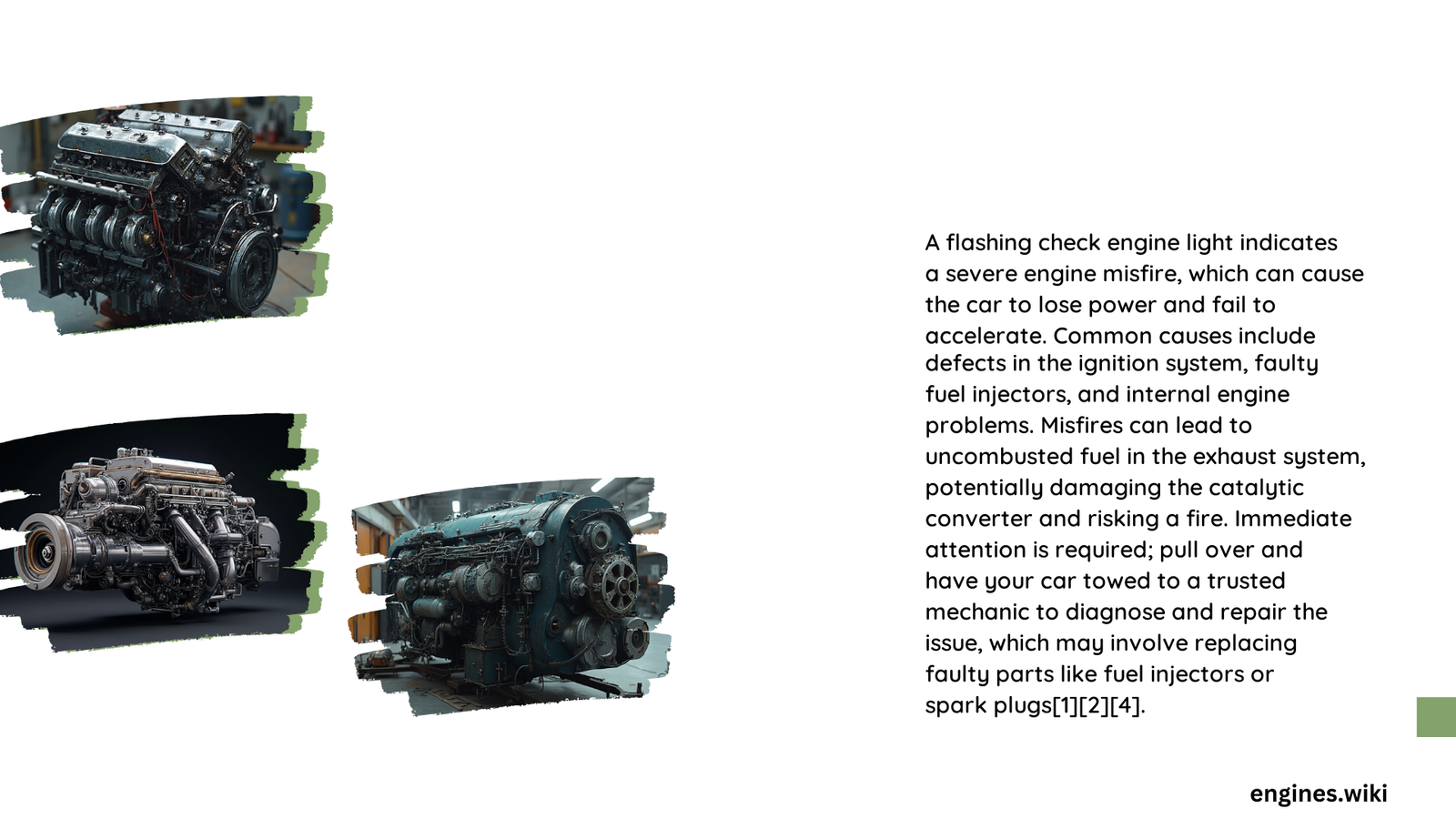A flashing check engine light coupled with acceleration issues is a serious warning sign that demands immediate attention. This combination typically indicates severe engine problems, such as misfires, fuel system malfunctions, or ignition system failures. Ignoring these symptoms can lead to extensive damage and costly repairs. This article explores the causes, diagnostic processes, and potential solutions for when your check engine light is flashing and your car is not accelerating properly.
What Are the Common Causes of a Flashing Check Engine Light and Poor Acceleration?
Several factors can contribute to a flashing check engine light and acceleration problems:
- Engine Misfires: Often the primary culprit, misfires can result from:
- Faulty spark plugs
- Damaged ignition coils
- Clogged fuel injectors
-
Malfunctioning oxygen sensors
-
Fuel System Issues:
- Failing fuel pump
- Clogged fuel filter
-
Stuck-open fuel injectors
-
Catalytic Converter Problems: A damaged or clogged converter can trigger the warning light and affect performance.
-
Ignition System Malfunctions: Issues with components like the distributor or ignition module can cause both symptoms.
How Can You Diagnose the Problem?

Follow these steps to diagnose the issue:
- Retrieve Diagnostic Trouble Codes (DTCs) using an OBD-II scanner
- Check for a loose gas cap
- Inspect engine components, electrical connections, and hoses
- Examine spark plugs and the ignition system
- Investigate the fuel system
- Test and replace faulty sensors if necessary
What Are the Specific Engine Performance Metrics to Consider?
When diagnosing a flashing check engine light and acceleration issues, consider these key metrics:
| Metric | Normal Range | Potential Issue if Out of Range |
|---|---|---|
| Fuel Pressure | 30-80 PSI (varies by vehicle) | Fuel pump or filter problem |
| Air-Fuel Ratio | 14.7:1 (stoichiometric) | Oxygen sensor or fuel injector malfunction |
| Ignition Timing | Varies by vehicle | Faulty ignition coil or module |
| Compression | 125-175 PSI (varies by engine) | Internal engine damage |
How Do Different Engine Components Impact This Issue?
Various engine components can contribute to a flashing check engine light and poor acceleration:
- Spark Plugs: Worn or damaged plugs can cause misfires. Replacement cost: $100-$300.
- Fuel Injectors: Clogged or malfunctioning injectors disrupt the air-fuel mixture. Cleaning/replacement cost: $50-$200 per injector.
- Mass Airflow Sensor: A faulty sensor can lead to incorrect air-fuel ratios. Replacement cost: $100-$300.
- Oxygen Sensors: Malfunctioning sensors can cause rich or lean conditions. Replacement cost: $50-$300 per sensor.
What Are the Steps to Fix a Flashing Check Engine Light and Acceleration Problems?
-
Retrieve and Analyze DTCs: Use an OBD-II scanner to read the codes and identify specific issues.
-
Address Engine Misfires:
- Replace faulty spark plugs
- Repair or replace damaged ignition coils
-
Clean or replace clogged fuel injectors
-
Resolve Fuel System Issues:
- Replace a failing fuel pump
- Install a new fuel filter
-
Clean or replace stuck-open fuel injectors
-
Check and Replace Faulty Sensors:
- Test and replace malfunctioning oxygen sensors
-
Inspect and replace a faulty mass airflow sensor if necessary
-
Examine the Catalytic Converter:
- Inspect for damage or clogs
-
Replace if necessary (cost can range from $500 to $2,500)
-
Address Ignition System Problems:
- Replace faulty ignition coils
-
Repair or replace a malfunctioning distributor
-
Clear DTCs and Test Drive: After addressing the issues, clear the codes and test drive the vehicle to ensure the problem is resolved.
What Are the Potential Consequences of Ignoring These Symptoms?
Ignoring a flashing check engine light and acceleration issues can lead to:
- Severe engine damage
- Catalytic converter failure
- Increased emissions
- Poor fuel economy
- Unsafe driving conditions
- Costly repairs if left unaddressed
How Can You Prevent Future Occurrences?
To minimize the risk of future check engine light and acceleration problems:
- Follow the manufacturer’s recommended maintenance schedule
- Use high-quality fuel and oil
- Replace spark plugs at recommended intervals
- Keep the air filter clean
- Address minor issues promptly before they escalate
- Perform regular diagnostic scans to catch potential problems early
By understanding the causes, diagnostic processes, and solutions for a flashing check engine light and acceleration problems, you can address these issues promptly and maintain your vehicle’s performance and longevity.
References:
1. Jake Electronics: Why is my check engine light flashing then stops & how to fix it?
2. Ford-Trucks Forum: Rough acceleration, blinking check engine light, bad compass
3. Expedition Forum: Engine light flashing when I accelerate
